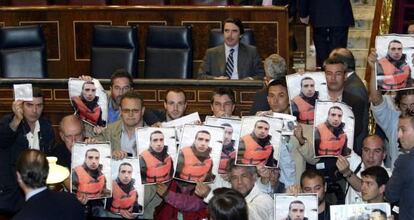High Court invokes Geneva Convention in Telecinco cameraman’s murder inquiry
Judge skirts government’s modifications to universal jurisdiction doctrine to keep Couso case open

The High Court on Monday moved to invoke the Geneva Convention in its efforts to continue investigating the alleged April 2003 killing of Telecinco cameraman José Couso by US soldiers during the invasion of Iraq.
The decision by Judge Santiago Pedraz sidesteps the Popular Party (PP) government’s recent modification of the Judicial Powers Act, which limits the Spanish courts from investigating international human rights abuse cases under the universal jurisdiction doctrine.
Pedraz’s ruling is the first legal maneuver to skirt the limitations imposed by Congress last month when it approved the restrictions after a heated debate that pitted the ruling PP against all opposition groups. Under the new rules, judges will only be able to open investigations against a suspected human rights violator if the defendant “is Spanish or a foreigner who frequently resides in Spain,” or who is currently in the country and Spanish authorities have refused to allow their extradition.
The Socialists have vowed to appeal the reform before the Constitutional Court.
Pedraz believes that the High Court can continue investigating the Couso case because the Geneva Convention prevails when it comes to protection of civilians during times of war.
Couso was reportedly covering the conflict from the Hotel Palestine in Baghdad when US army troops opened fire on the building. Scores of foreign journalists had been staying at the hotel but the US military later said that soldiers were attacked by sniper fire coming from the Palestine. Ukrainian journalist Taras Protsyuk was also killed in the attack.
Specifically, Pedraz has issued international summons in his murder investigation for Lieutenant Colonel Philip de Camp, Captain Philip Wolford and Sergeant Thomas Gibson, who reportedly opened fire as Couso was recording from his hotel room balcony.
The United States has refused to cooperate in the inquiry.
In his 11-page writ, Pedraz states that the Geneva Convention obliges Spain to “prosecute the crime (search for people and make them appear) regardless of the perpetrators’ nationalities and wherever they may be.” As such, the judge writes, the court cannot fall back on the new modifications by Congress to the Judicial Powers Act.
“The judge must refrain from applying this new rule. The rule of law requires the existence of independent bodies to protect the rights and freedoms of citizens, by impartially applying standards that express the people’s will and control the activities of public authorities,” he wrote.
The PP government had come under pressure recently by Beijing after the High Court opened an investigation and later issued arrest warrants against former Chinese President Jiang Zemin, ex-Prime Minister Li Peng and three other high-ranking former officials of the Chinese Communist Party for alleged crimes against humanity in Tibet.
Spanish government officials explained that they were moving to modify the concept of universal jurisdiction because many cases under investigation were creating “unnecessary diplomatic conflicts” with other nations.
In 2010, the WikiLeaks whistleblower organization released several diplomatic US Embassy cables that showed how Washington tried to pressure the previous Socialist government of Prime Minister José Luis Rodríguez Zapatero into dropping the Couso inquiry.
Tu suscripción se está usando en otro dispositivo
¿Quieres añadir otro usuario a tu suscripción?
Si continúas leyendo en este dispositivo, no se podrá leer en el otro.
FlechaTu suscripción se está usando en otro dispositivo y solo puedes acceder a EL PAÍS desde un dispositivo a la vez.
Si quieres compartir tu cuenta, cambia tu suscripción a la modalidad Premium, así podrás añadir otro usuario. Cada uno accederá con su propia cuenta de email, lo que os permitirá personalizar vuestra experiencia en EL PAÍS.
¿Tienes una suscripción de empresa? Accede aquí para contratar más cuentas.
En el caso de no saber quién está usando tu cuenta, te recomendamos cambiar tu contraseña aquí.
Si decides continuar compartiendo tu cuenta, este mensaje se mostrará en tu dispositivo y en el de la otra persona que está usando tu cuenta de forma indefinida, afectando a tu experiencia de lectura. Puedes consultar aquí los términos y condiciones de la suscripción digital.








































